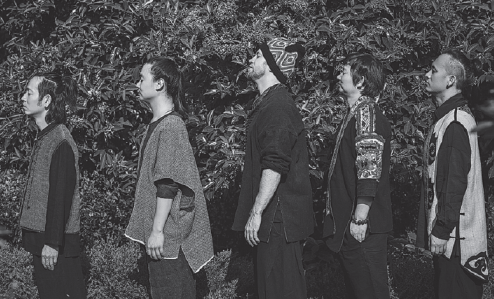Music of the mountain men
A band that draws on various ethnic influences says its performances can be enjoyed by all, Chen Nan reports.

The Chinese word shan meaning mountain appears in the name of the Chinese band Shanren, literally meaning "mountain men". It has also been used in the band's first two albums: the self-titled album in 2009 and Ting Shan, or Listen to the Mountain, in 2013.
As the band's frontman Qu Zihan puts it, "We all come from the mountains", and "The band's music implies wisdom with Chinese characteristics."
On June 26 the band released their third album in eight years. The new album continues the band's style of using the word shan and is titled Shan Dao, combining mountain and road.
"Dao refers to the road we've traveled so far," Qu says. "We also look back upon our experience as a band, summing up our musical philosophy."
Formed in 1999, the band, hailing from the mountainous province of Yunnan, uses a number of musical instruments of ethnic groups, such as: the xianzi, a plucked instrument of the Yi ethnic group; the bawu, a blown instrument of the Hani ethnic group; and the dabiya, a plucked stringed instrument of Nu ethnic group.
The new album, featuring 11 songs, opens with a song titled Birdsong, which was adapted from a folksong of the Va ethnic group in Yunnan province. The song, performed in local languages of the Va and Yi ethnic groups, combines electronic music, rap and folk music elements and is an ode to nature.
Jino Song is based on a folk song of the Jino ethnic group, featuring reggaeton beats. The folksong portrays the people of the Jino ethnic group singing and dancing in their tribes in Yunnan province.
Love Song of the Stone Forest was adapted from a folk song of the Yi ethnic group. Folk musical instruments such as the flute, the kouxian (Jew's harp) and the three-stringed huqin are used in performing the song.
In addition to adapting folk songs of ethnic groups of Yunnan province, Qu also wrote original material.
The song Time in Vain talks of his life when he lived in Beijing.
"I walk on the road silently," the lyrics say. "The people passing by are busy. It's another day and I feel reluctant to stand here."
Qu says: "We didn't fit very well with the fast-paced life in bigger cities such as Beijing. When you live in the city too long you feel empty and need to recharge. So in 2017 we returned to Yunnan. Now we have our own studio in Kunming and we grow lots of plants in the garden, and that allows us to be closer to nature.
"It's also easier for us to travel to villages of Yunnan to learn folk music and collect material. Many of the folk songs performed by ethnic groups are used for various occasions, such as weddings, funerals and hunting. For example, you need to play musical instruments and sing if you want to express your love to your girlfriend or boyfriend."
Shanren's members come from various ethnic backgrounds. The bassist Sigao Ala is from the Yi ethnic group; the multi-instrumentalist Fu Te is from the Bouyei ethnic group; and Qu and the drummer Ou Jianyun are Han Chinese; the percussionist Sam Debell is from Britain.
Qu says his early life involved a lot of moving and traveling, and after settling in the city of Kunming he felt a sense of belonging.
Born and growing up in mountainous regions of western Yunnan, Qu learned many local ethnic songs. He did not realize the value of those tunes until much later, he says.
"I listened to Western rock music like many young people, and I tried to play with Western musical instruments when I decided to launch a career as a rock musician. However, I found the instruments' limitations made it difficult to forge my own style."
After forming Shanren he further realized that the band could not make a breakthrough with Western musical instruments and musical styles but discovered endless new possibilities with Chinese instruments, especially those belonging to ethnic groups.
In addition to gaining a big following in China, particularly among the young, it toured nationwide.
Shanren has also performed overseas, including in Britain, Canada, Indonesia, Spain and the United States. Qu says there is no barrier for international audiences to appreciate the band's music. In 2016 the band won the TV reality show Sing My Song, aired on China Central Television, which gave its music huge exposure. The group became one of the few rock bands presented on TV variety shows when it was featured on Hunan Satellite TV's Happy Camp.
"Compared with many other successful Chinese bands we are not that well-known," Qu says. "But we obviously have a following, and since our TV appearances we have been recognized by people on the street. For Shanren the ultimate goal is to create music that makes people happy."



Today's Top News
- Macao SAR holds flag-raising, reception to mark 26th anniversary of return to motherland
- China issues rules to regulate pricing practices of internet platforms
- US hits over 70 IS-linked targets in Syria in massive retaliatory strikes
- Coffee needs cooperation, not confrontation
- Technological innovation brings cultural heritage alive
- Consumption to play bigger part in growth






























